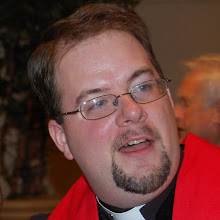My own knowledge of myself is remarkably limited...self-awareness is not one of my strong suits, and I've never been good socially. And, of course, this is intimately related to how well I can relate to and understand another human being. How this relates to our salvation, witness, and life in the Spirit is the concern of Rowan Williams' excellent Where God Happens: Discovering Christ in One Another.
This litle book is actually a reflection upon the contemporary state of society and the church through the lens of the Desert Fathers & Mothers, and he relies heavily upon Benedicta Ward's excellent translation of the Sayings, for it is liberally sprinkled with statements and anecdotes illuminating a monastic vocation both dramatically different from our common life and remarkably desirable. Williams begins with the father of desert monasticism, St Anthony, and his interlinked concern with salvation and communal relationships:
Our life and death is with our neighbor. If we win our brother, we win God. If we cause our brother to stumble, we have sinned against Christ. (13)
The question that Where God Happens raised for me throughout has to do with the relationship between the type of faith encouraged by Williams and his monastic forbears and the current communities of faith most of us find ourselves in. To say that this type of reflection, action, and comprehension would be alien to the churches I'm associated with is an understatement. I'm forced to wonder: "Does this presume a more rigorous community that is throughly familiar with and committed to a Biblical/gospel faith?"
Or is this putting the cart before the horse? Perhaps all it takes is a St Anthony figure who is willing to live life with others, yet in isolation, to begin the transformative work in a local church or community. Williams proposes that we consider not a casuistic approach to ethics (in which you have a certain scenario, and then a set of responses) but a virtue-ethics approach which focuses on shaping character rather than outcomes. This is why Williams understands the church's blessing on life-long commitments such as marriage and ordination vows (and monastic vows): those who take them "are bound to the patient, long-term discovery of what grace will do with them" (67).
So I am not surprised that Williams, despite his position as Archbishop of Canterbury and spiritual leader of the worldwide Anglican Communion, observes that "the church is always renewed from the edges rather than from the center. There is a limit to what the institutional church can do" (111). The priorities of being church as Jesus calls his disciples to be church are always at least in danger of being displaced (if it's not already happening) by the values of being a self-perserving, continuing institution. If anyone understands this better than Williams, their address must have Vatican City in it. So we return to the need for Church (whether local or global) to have renewal elements which call us back to the dirty here-and-now, the unpolished enfleshed existence which is but our raw material--not the end product.
Where God Happens is a difficult and challenging read, despite its lack of theological insider-language and brevity. It is precisely the kind of book which will haunt me for a long time after its reading, for its incisive description of human nature (my nature) as well as its insistence on the basic shape of the Kingdom of God and salvation. Williams reminds us that in the Christian life, "the goal is reconcilation with God by way of this combination of truth and mercy...to heal by solidarity, not condemnation" (19, 20).








